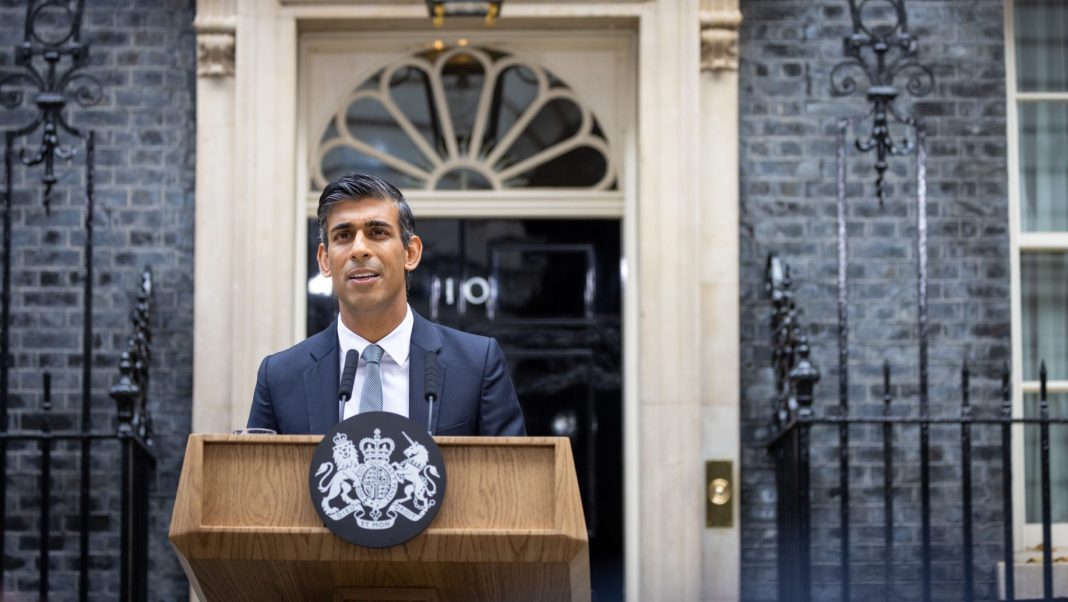The optics couldn’t have been worse. Seemingly drowned by the rain and drowned out by the New Labour anthem of 1997, Rishi Sunak finally answered the question – he finally set the date. In turn, he has united his MPs more effectively than at any point during his tenure in Number 10. They are almost universally asking: Why now, why today?
The shock of this announcement should not be overestimated. For a political class that has been gripped by this question for months, no one other than eight or so trusted advisors had any idea what was to come until Wednesday morning. That was when rumours started to build and by the time ministers had been summoned at 16:15, the world’s press were already reporting the date.
So, onto that question of why. It seems that Sunak and his team (particularly Deputy PM Oliver Dowden) believe that they do have a story to tell. The previously held consensus that something might come up to disrupt Labour’s vast 20-point polling lead before the autumn seems to have run out of road.
It is no coincidence that this announcement came the day that inflation numbers dropped to 2.3%, their lowest levels in two years. As of this month, the energy price cap is also starting to come down. Likewise, legal migration is falling with visa applications across key routes falling 25% from the start of the year. Most importantly perhaps, there is no longer any fiscal headroom for a potential pre-election tax cut come the autumn. On the surface then, Sunak might not be totally wrong. The real question is whether he, having just hit a personal low in favourability polling, is the person to tell that story.
In a similar vein, just a little digging into those numbers gives a much fuller picture of where the country is at. Economically, yesterday’s numbers were actually a disappointment to many economists as inflation fell slightly less than expected. Underlying numbers, not taking into account falls in energy prices, show that services inflation is still at 5.9%. By all accounts, this makes any June inflation rate cuts by the Bank of England unlikely. Chancellor Jeremy Hunt conceded himself yesterday on the Today Programme that British people felt “battered and bruised”.
Potentially worse for Sunak is that Thursday, the first day of campaigning, is set to be marked by figures on illegal migration. So far this year, small boat crossings in the Channel are up by nearly a quarter on last year and that is expected to get worse going into the summer. Even if you do believe that ‘stopping the boats’ is a viable policy on which to fight an election, it is another point on which Sunak is currently failing. If he wants to run this election on security, as he has intimated in recent days, his opponent simply isn’t as daunting as Jeremy Corbyn.
These signs point towards another line of reasoning from the Prime Minister. As opposed to waiting for things to get better, he has clearly made the calculation that they can only get worse.
To his credit, Sunak has made a somewhat bold decision and it would be foolish to claim at this point that any result was certain. There is almost no doubt that the current poll lead for Labour will narrow, possibly significantly come July. The challenge for Starmer to overcome the result of 2017 should not be underestimated. Labour still has policy to sort out, and there is little excitement so far from the electorate, despite its “First Steps” event last week.
Unfortunately for Sunak, though, if he had wanted to look bold and in control, his team let him down. From speaking in the briefing room inside Number 10 to the simple use of an umbrella, there were countless ways to avoid the catastrophic optics of his announcement on Wednesday afternoon. Instead, he stepped out to announce an election looking like a man already defeated, cutting and running.
The Conservative Party will tell you until they’re blue in the face that there is “no enthusiasm for Keir Starmer” and that he is “no Tony Blair”. That might be true – the Labour leader is polling nowhere near to his 1997 comparison. The reality, though, is that Starmer doesn’t need to beat Tony Blair: he needs to beat Rishi Sunak.


